immune support
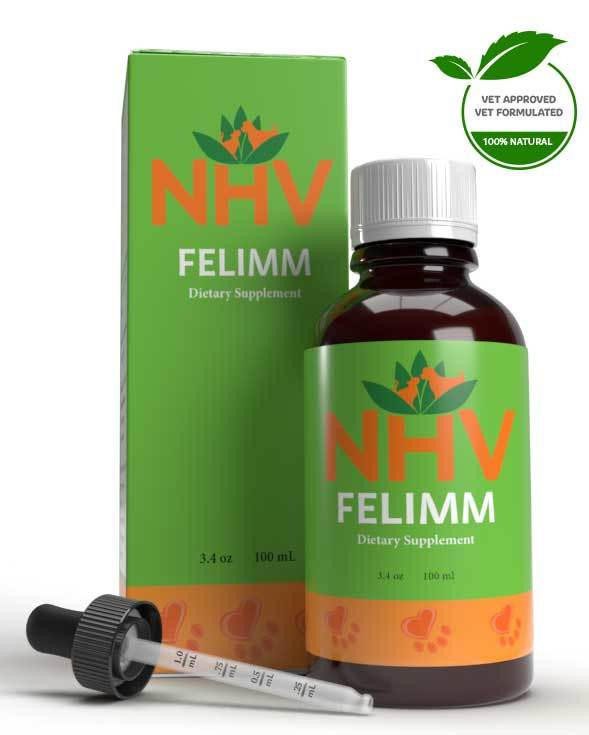
free shipping over $100 (USA & Canada)
1-877-937-4372 the pet expert hotline
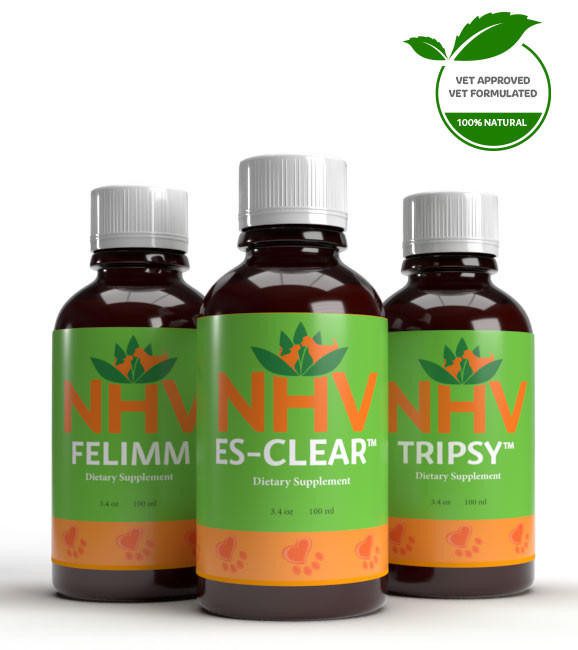

When your furkiddo is diagnosed with lymphoma, it is heartbreaking and it can be difficult to understand the different types of lymphoma. The type of lymphoma your pet is diagnosed with may affect the treatment options and symptoms they will experience. To help make it easier, let’s break down the difference between B-cell and T-cell lymphoma.
The immune system is made up of cells that form lines of defense to fight foreign threats like bacteria and viruses. In this “defense army” we have the innate immune cells and the adaptive immune cells. T-cells and B-cells are also called lymphocytes and they are part of the adaptive immune cells which travel around the body through the lymphatic system.
Lymphoma is one of the most commonly diagnosed neoplasms in cats and it accounts for almost ¼ of all neoplasms diagnosed in dogs.
The B-cells fight bacteria and viruses by producing antigen-specific immunoglobulin (Ig) directed against these invasive pathogens. These Ig’s are also known as antibodies and they attach themselves onto the surface of the invading cells and mark them for destruction by other immune cells. In some cases, they can also kill these cells themselves.
When it comes to the T-cells, we have two main types: Helper T-cells and Natural killer T-cells (NKT). They are called T cells because they are predominantly produced in the thymus, an extremely important organ of the immune system.
The “Helper T-cells” stimulate B-cells to produce antibodies to fight against external threats and also help killer cells to develop. The Natural Killer T-cells (NKT) will directly kill cells that have already been infected by a foreign invader. These T-cells also send an alert to the rest of the immune system when they need to create a response.
Lymphoma is the name given to a malignant transformation and growth of differentiated lymphocytes in tissues like lymph nodes, visceral organs, and bone marrow. It is one of the most commonly diagnosed neoplasms in cats and it accounts for almost ¼ of all neoplasms diagnosed in dogs. The most common types of lymphoma are mediastinal, multicentric, extra-nodal, and alimentary lymphoma, which targets mainly the gastrointestinal tract but it can also involve lymph nodes, liver, and spleen. This is the most common anatomical form of lymphoma seen in pets.

There are many ways to classify a lymphoma and the many subtypes can be defined according to the histological grade (low, intermediate, or high), cell size (small or large), and phenotype (T or B) of the neoplastic lymphocytes.
When it comes to the alimentary form there are two types of classification: the “mucosal lymphomas” which are usually low-grade forms and are predominantly made of small T-cell type. However, most of the cases of high-grade alimentary lymphomas are composed of small or large cells that can be either B- or T-cell types. The gastrointestinal tract has the largest population of lymphoid and accessory immune cells in the body and therefore, it is a common target for lymphoma.
There are different types of B-cell lymphomas, which will originate in the B-lymphocytes and can be either slow-growing or fast and aggressive. The most common types of B-cell lymphomas are diffuse large and mediastinal B-cell lymphoma.
In cats positive for Feline Leukemia Virus (FeLV), it’s important to point out that this virus infects the lymphoid tissue, intestines, and bone marrow and is suspected to be a huge risk factor in the development of leukemia and lymphoma in cats, particularly T-cell lymphoma with a mediastinal location.
Cytologic examination of tissues affected by lymphoma is normally a highly effective method of diagnosis, especially in canine lymphoma and histopathology is commonly required for definitive diagnosis in both dogs and cats.
Regardless of the subtype, the successful treatment of lymphoma can include chemotherapy, radiotherapy, and even surgery in most cases. Generally speaking, the main goal of the therapy is to achieve long-term remission and good quality of life for the pet. NHV supplements can provide good support for pets fighting lymphoma of any kind and here are some recommendations that can be helpful:
Felimm: This formula encourages detoxification of the lymphatic system, helps strengthen the immune system, helps fight infections, stimulates appetite, improves energy levels, and helps combat upper respiratory tract infections. Felimm is also our main support for viral infections such as FIV and FeLV which can leave the cat more prone to develop lymphoma.
Yucca: Corticosteroids are often used in lymphoma treatment and Yucca stimulates the body to produce its own natural corticosteroids. Yucca is formulated and dosed specifically to be safe for long-term use in pets and it has been used successfully to help control discomfort and inflammation in the body.
Natures Immuno: a blend of mushrooms known for their extensive health benefits. These mushrooms are reported to help improve the body’s ability to produce white blood cells, it can be used as an adjunct with chemotherapy, it supports the immune system and helps fight against viral infections. It’s very beneficial as anti-cancer and anti-tumor support. It’s useful for cardiovascular, liver, kidney, diabetic, and endocrine health as well and helps promote general well-being. One of the mushrooms in this formula is the Turkey Tail mushroom. Studies have shown that it is beneficial for a wide variety of cancers, including mammary gland cancer and lymphoma. Researchers believe that Turkey Tail mushrooms contain properties that fight cancer while also helping to strengthen the immune system.
Petomega 3: Eicosapentaenoic acid (EPA) and docosahexaenoic acid (DHA) are omega-3 fatty acids found in fish oils that can be beneficial to a pet with lymphoma. They not only prevent weight loss, but they can also decrease inflammation and may inhibit metastasis as well
Let us be a part of your pet’s journey to a healthier life. In case you have any questions or concerns, our team of pet experts will be more than happy to help.
immune support

Helps your pet fight Feline Leukemia, FIV virus,other viral infections, and lymphoma
buy 2 and save $3
3 month supply for a small to medium size pet.

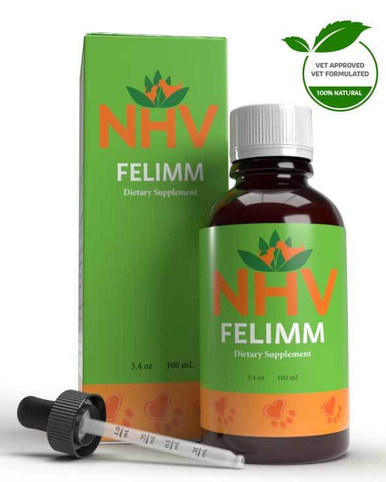

FeLV and FIV have a strong negative impact on your cat’s immune system and general wellbeing. Left untreated, FeLV can cause serious health issues and other cancers, including lymphoma. Add this natural support to the symptomatic treatment for feline leukemia and FIV that your vet recommends along with diet and nutrition to give them the best fighting chance.
It’s important to help balance your cat’s immune system to help them defend against daily contact with environmental bacteria, fungi, viruses, and protozoa.
NHV’s all-natural supplements for feline leukemia and FIV are formulated by a master herbalist, and a holistic veterinarian with over 20 years of experience.
Felimm for cats contains powerful herbal ingredients that help in fighting viruses and balancing your kitty’s natural immune system.
Add this natural support to the treatment for feline leukemia recommended by your veterinarian. Read more about leukemia and FIV on the holistic veterinarian, Dr. Hillary Cook’s blog.
With the right support cats with FeLV and FIV can lead healthy lives.
NHV offers a Feline Leukemia (FeLV) Kit which is available in both a fighter pack and immune and antioxidant support pack. We also provide a Feline Immunodeficiency Virus (FIV) Kit because, at NHV, we believe in giving our pet parents everything they need to care for their kitty naturally.
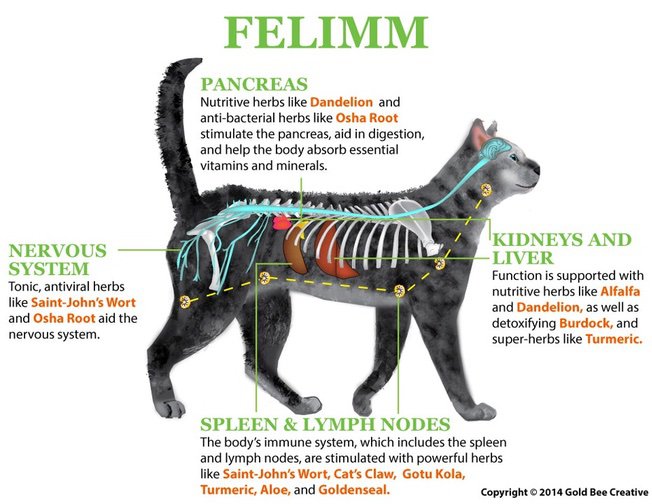
St. John’s Wort – A potent antiviral that helps control viral infections and stimulates your cat’s immune system.
Turmeric – A powerful antioxidant that helps fight the damaging effects of free radicals. It strengthens liver function and contains strong antifungal properties.
Aloe Vera – Contains Acemannan, which has been proposed as an adjunctive therapy for cats with FIV. Aloe also contains high levels of vitamins, minerals, amino acids, and other nutrients important for cats with immune disorders.
Alfalfa – Contains high levels of chlorophyll, which works as an antioxidant in your cat's bloodstream. It also contains nutrients beneficial to cats with immune disorders.
Burdock – Helps cleanse the body of toxins and waste that accumulate during illness. It is also high in calcium, phosphorus, iron, thiamine, and riboflavin.
Cat’s Claw – A powerful anti-inflammatory and antioxidant that supports your cat’s immune system and helps strengthen its defenses against viruses like leukemia.
Osha – A natural immune builder that helps pets fight infections including FeLV and FIV. Also has antibacterial and antiviral properties.
Dandelion – A highly nutritious food that stimulates liver secretion, improves digestion and stimulates appetite. It also protects the kidneys and has anti-inflammatory properties.
Gotu Kola– An antioxidant-rich herb known to strengthen the immune system and protect cells from damage caused by free radicals. Helps calm the nervous system.
Usnea – An immune system stimulant with anti-bacterial and anti-fungal properties that help protect your cat’s weakened immune system from Candida Albicans.
Goldenseal – An immune supporting herb with blood cleansing properties.
Myrrh – Helps control bacterial infections that cats with compromised immune systems are so vulnerable to.
Select your pet's weight to determine the correct dose.
To be taken twice daily. Determine your pet’s weight and then use the easy chart below to determine the correct dose. This is the minimum dosage.
Pet's Weight Dosage
0 - 15 lb = 0.5 ml
16 - 30 lb = 1.0 ml
31 - 45 lb = 1.5 ml
46 - 60 lb = 2.0 ml
61 - 75 lb = 2.5 ml
Over 75 lb = 3.0 ml
How to Administer
Shake well before use. The easiest method is to use the dropper provided and place the drops into your pet’s food or favorite treat. You can also use the dropper and squirt directly into the pet’s mouth. Some pets can be finicky, if this occurs consider hiding the drops in foods most pet’s love such as fish, chicken or yogurt or a favourite treat. If your pet only eats dry food then soak a few kibbles at feeding time.
For Best Results
Herbal dietary supplements are beneficial to the health and well-being of your pet and are safe for long-term use. Every pet responds to natural herbal supplements differently, therefore it is important to be consistent and administer the product daily. Supplements generally take two to four weeks to take effect, however this will vary from one animal to the next.
Product Storage
All NHV Natural Pet Products are pure herbal extracts and contain no artificial additives, preservatives or coloring. Shelf life after opening is 6 months and must be refrigerated after opening.
Cautions and Contraindications
Do not use Felimm in pregnant or nursing animals. Speak to your vet before using our products. A second visit is recommended if your pet’s condition does not improve, or deteriorates after continued use of the supplements.
All information provided by NHV Natural Pet Products is for educational purposes only.
FeLV and FIV have a strong negative impact on your cat’s immune system and general wellbeing. Left untreated, FeLV can cause serious health issues and other cancers, including lymphoma. Add this natural support to the symptomatic treatment for feline leukemia and FIV that your vet recommends along with diet and nutrition to give them the best fighting chance.
It’s important to help balance your cat’s immune system to help them defend against daily contact with environmental bacteria, fungi, viruses, and protozoa.
NHV’s all-natural supplements for feline leukemia and FIV are formulated by a master herbalist, and a holistic veterinarian with over 20 years of experience.
Felimm for cats contains powerful herbal ingredients that help in fighting viruses and balancing your kitty’s natural immune system.
Add this natural support to the treatment for feline leukemia recommended by your veterinarian. Read more about leukemia and FIV on the holistic veterinarian, Dr. Hillary Cook’s blog.
With the right support cats with FeLV and FIV can lead healthy lives.
NHV offers a Feline Leukemia (FeLV) Kit which is available in both a fighter pack and immune and antioxidant support pack. We also provide a Feline Immunodeficiency Virus (FIV) Kit because, at NHV, we believe in giving our pet parents everything they need to care for their kitty naturally.

St. John’s Wort – A potent antiviral that helps control viral infections and stimulates your cat’s immune system.
Turmeric – A powerful antioxidant that helps fight the damaging effects of free radicals. It strengthens liver function and contains strong antifungal properties.
Aloe Vera – Contains Acemannan, which has been proposed as an adjunctive therapy for cats with FIV. Aloe also contains high levels of vitamins, minerals, amino acids, and other nutrients important for cats with immune disorders.
Alfalfa – Contains high levels of chlorophyll, which works as an antioxidant in your cat's bloodstream. It also contains nutrients beneficial to cats with immune disorders.
Burdock – Helps cleanse the body of toxins and waste that accumulate during illness. It is also high in calcium, phosphorus, iron, thiamine, and riboflavin.
Cat’s Claw – A powerful anti-inflammatory and antioxidant that supports your cat’s immune system and helps strengthen its defenses against viruses like leukemia.
Osha – A natural immune builder that helps pets fight infections including FeLV and FIV. Also has antibacterial and antiviral properties.
Dandelion – A highly nutritious food that stimulates liver secretion, improves digestion and stimulates appetite. It also protects the kidneys and has anti-inflammatory properties.
Gotu Kola– An antioxidant-rich herb known to strengthen the immune system and protect cells from damage caused by free radicals. Helps calm the nervous system.
Usnea – An immune system stimulant with anti-bacterial and anti-fungal properties that help protect your cat’s weakened immune system from Candida Albicans.
Goldenseal – An immune supporting herb with blood cleansing properties.
Myrrh – Helps control bacterial infections that cats with compromised immune systems are so vulnerable to.
Select your pet's weight to determine the correct dose.
To be taken twice daily. Determine your pet’s weight and then use the easy chart below to determine the correct dose. This is the minimum dosage.
Pet's Weight Dosage
0 - 15 lb = 0.5 ml
16 - 30 lb = 1.0 ml
31 - 45 lb = 1.5 ml
46 - 60 lb = 2.0 ml
61 - 75 lb = 2.5 ml
Over 75 lb = 3.0 ml
How to Administer
Shake well before use. The easiest method is to use the dropper provided and place the drops into your pet’s food or favorite treat. You can also use the dropper and squirt directly into the pet’s mouth. Some pets can be finicky, if this occurs consider hiding the drops in foods most pet’s love such as fish, chicken or yogurt or a favourite treat. If your pet only eats dry food then soak a few kibbles at feeding time.
For Best Results
Herbal dietary supplements are beneficial to the health and well-being of your pet and are safe for long-term use. Every pet responds to natural herbal supplements differently, therefore it is important to be consistent and administer the product daily. Supplements generally take two to four weeks to take effect, however this will vary from one animal to the next.
Product Storage
All NHV Natural Pet Products are pure herbal extracts and contain no artificial additives, preservatives or coloring. Shelf life after opening is 6 months and must be refrigerated after opening.
Cautions and Contraindications
Do not use Felimm in pregnant or nursing animals. Speak to your vet before using our products. A second visit is recommended if your pet’s condition does not improve, or deteriorates after continued use of the supplements.
All information provided by NHV Natural Pet Products is for educational purposes only.
discomfort support


Support for Discomfort and Appetite Stimulant
buy 2 and save $3
3 month supply for a small to medium size
NHV Yucca is used for cats as a supplement to provide nutrients, and may be helpful for discomfort, inflammation, and to increase or balance the appetite.


NHV Yucca is used for cats as a supplement to provide nutrients, and may be helpful for discomfort, inflammation, and to increase or balance the appetite.

Yucca is used in cat food as well as food for other animals around the world. Its root is a highly nutritious herb that’s rich in vitamin C, beta-carotene, B vitamins, magnesium, iron, calcium, manganese, protein, niacin, and phosphorus.
Yucca contains two very beneficial compounds: sarsasapogenin and smilagenin. These two compounds work on the mucous membranes of the small intestine. These compounds help with the penetration and absorption of minerals and vitamins. Sarsasapogenin and smilagenin are known as steroidal saponins (phytosterols) which act as precursors to corticosteroids produced naturally by the body.
Steroidal saponins support the immune function of the body while stimulating and supporting the production of its own corticosteroids and corticosteroid–related hormones. Due to this action, studies conducted on Yucca have shown that it may be beneficial and effective for discomfort relief and inflammation in conditions such as arthritis. Yucca for cats may also be a natural appetite stimulant and may also help reduce the production of urease, which contributes to the unpleasant odors of urine and feces in some cats.
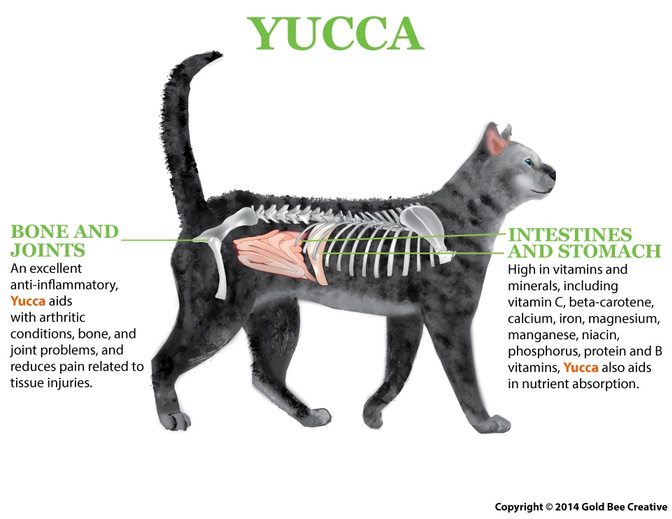
Yucca - Commonly used for supporting arthritis, as an anti-inflammatory, nutritive, antitumor, and digestive supplement.

Select your pet's weight to determine the correct dose.
To be taken twice daily. Determine your pet’s weight and then use the easy chart below to determine the correct dose. This is the minimum dosage.
Pet's Weight Dosage
0 - 15 lb = 0.5 ml
16 - 30 lb = 1.0 ml
31 - 45 lb = 1.5 ml
46 - 60 lb = 2.0 ml
61 - 75 lb = 2.5 ml
Over 75 lb = 3.0 ml
How to Administer: Shake well before use. The easiest method is to use the dropper provided and place the drops into your pet’s food or favorite treat. You can also use the dropper and squirt directly into the pet’s mouth. Some pets can be finicky, if this occurs consider hiding the drops in foods most pet’s love such as fish, chicken, yogurt, or a favorite treat. If your pet only eats dry food then soak a few kibbles at feeding time.
For Best Results: Herbal dietary supplements are beneficial to the health and well-being of your pet and are safe for long-term use. Every pet responds to natural herbal supplements differently, therefore it is important to be consistent and administer the product daily. Supplements generally take two to four weeks to take effect, however this will vary from one animal to the next.
Product Storage:
All NHV Natural Pet Products are pure herbal extracts and contain no artificial additives, preservatives or coloring. Shelf life after opening is 6 months and must be refrigerated after opening.
Cautions and Contraindications
Do not use Yucca in pregnant or nursing animals.
Speak to your vet before using our products. A second visit is recommended if your pet’s condition does not improve, or deteriorates after continued use of the supplements. All information provided by NHV Natural Pet Products is for educational purposes only.
Yucca is used in cat food as well as food for other animals around the world. Its root is a highly nutritious herb that’s rich in vitamin C, beta-carotene, B vitamins, magnesium, iron, calcium, manganese, protein, niacin, and phosphorus.
Yucca contains two very beneficial compounds: sarsasapogenin and smilagenin. These two compounds work on the mucous membranes of the small intestine. These compounds help with the penetration and absorption of minerals and vitamins. Sarsasapogenin and smilagenin are known as steroidal saponins (phytosterols) which act as precursors to corticosteroids produced naturally by the body.
Steroidal saponins support the immune function of the body while stimulating and supporting the production of its own corticosteroids and corticosteroid–related hormones. Due to this action, studies conducted on Yucca have shown that it may be beneficial and effective for discomfort relief and inflammation in conditions such as arthritis. Yucca for cats may also be a natural appetite stimulant and may also help reduce the production of urease, which contributes to the unpleasant odors of urine and feces in some cats.

Yucca - Commonly used for supporting arthritis, as an anti-inflammatory, nutritive, antitumor, and digestive supplement.

Select your pet's weight to determine the correct dose.
To be taken twice daily. Determine your pet’s weight and then use the easy chart below to determine the correct dose. This is the minimum dosage.
Pet's Weight Dosage
0 - 15 lb = 0.5 ml
16 - 30 lb = 1.0 ml
31 - 45 lb = 1.5 ml
46 - 60 lb = 2.0 ml
61 - 75 lb = 2.5 ml
Over 75 lb = 3.0 ml
How to Administer: Shake well before use. The easiest method is to use the dropper provided and place the drops into your pet’s food or favorite treat. You can also use the dropper and squirt directly into the pet’s mouth. Some pets can be finicky, if this occurs consider hiding the drops in foods most pet’s love such as fish, chicken, yogurt, or a favorite treat. If your pet only eats dry food then soak a few kibbles at feeding time.
For Best Results: Herbal dietary supplements are beneficial to the health and well-being of your pet and are safe for long-term use. Every pet responds to natural herbal supplements differently, therefore it is important to be consistent and administer the product daily. Supplements generally take two to four weeks to take effect, however this will vary from one animal to the next.
Product Storage:
All NHV Natural Pet Products are pure herbal extracts and contain no artificial additives, preservatives or coloring. Shelf life after opening is 6 months and must be refrigerated after opening.
Cautions and Contraindications
Do not use Yucca in pregnant or nursing animals.
Speak to your vet before using our products. A second visit is recommended if your pet’s condition does not improve, or deteriorates after continued use of the supplements. All information provided by NHV Natural Pet Products is for educational purposes only.
medicinal mushroom blend
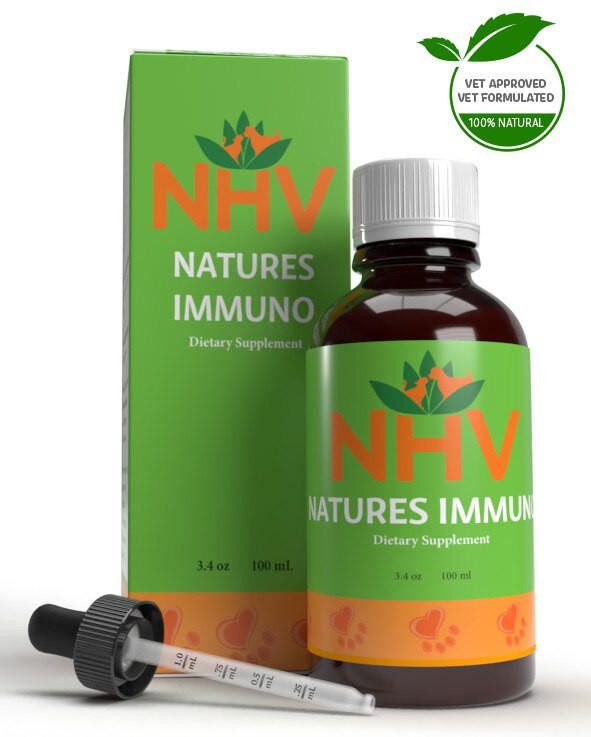
Blend of medicinal mushrooms (turkey tails, cordyceps, reishi, shiitake, agaricus)
buy 2 and save $3
3 month supply for a small to medium size pet

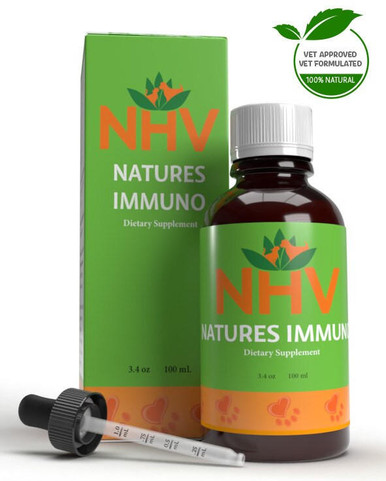

Medicinal mushroom blends are used by holistic and conventional veterinarians to help cats suffering from a variety of health conditions. Their immune supporting effects help with feline cancer, chronic feline infections, liver disorders, compromised immune systems, endocrine disorders, and kidney, respiratory, and cardiovascular problems.
Medicinal mushrooms are currently being researched and studied for their vast array of health benefits. NHV uses these mushrooms as a primary ingredient in supplements that support the immune system of cats.
The healing power of medicinal mushrooms has been known throughout Asia for thousands of years. The pharmacological potential of medicinal mushrooms is being extensively studied around the globe. Research is finding that specific medicinal mushrooms, like Turkey Tail mushrooms, may have the potential to help treat cancer, balance the immune system, and aid with digestive problems.
“The mounting evidence from various research groups across the globe, regarding anti-tumor application of mushroom extracts unarguably make it a fast-track research area worth mass attention.” – (Patel and Goyal, 2012)
The five well-researched mushrooms contained in our vet-formulated cat immune support supplement blend include:
Because this blend is in liquid form, it helps increase the bioavailability of the mushrooms, so your cat absorbs the medicine at a faster rate.
Use NHV’s holistic immune cancer support for cats with treatment prescribed by your vet for comprehensive care. You can always ask the experts at NHV where our pet experts are here to help answer questions, offer guidance and give support along the way.
Read more about cat immune support using the miracles of medicinal mushrooms on our blog because, at NHV, we care about your cat’s health naturally.
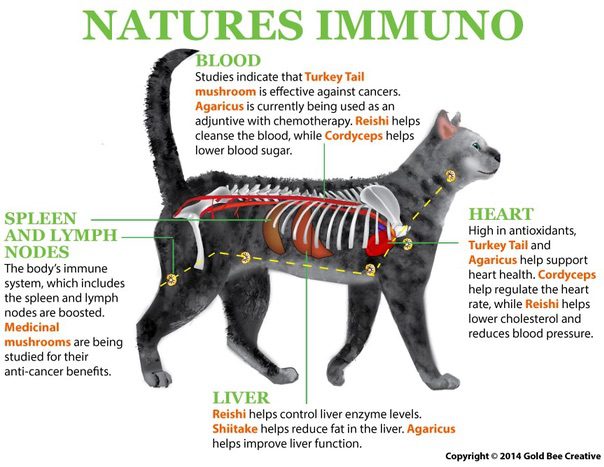
Turkey Tail mushroom has traditionally been used in Native American herbalism and in Chinese medicine to help improve immune function. It is a mushroom that has undergone a considerable resurgence in modern research for its health benefits. Studies have shown that it is beneficial for a wide variety of cancers, including mammary gland cancer and lymphoma. Researchers believe that Turkey Tail mushrooms contain properties that fight cancer while also helping to strengthen the immune system. It has antioxidant, anticarcinogenic, immune-modulating, anti-inflammatory, and cardioprotective properties.
Cordyceps mushroom is rich in phytonutrients and contains polysaccharides, which help with antioxidant properties. Research has indicated that cordyceps have anti-tumor, immune stimulating and hypoglycemic activity. They are beneficial for diabetes as they help lower blood sugar. Cordyceps are also beneficial for heart health, liver and kidney health.
Reishi mushroom has been used for thousands of years in traditional Chinese Medicine. Current research indicates that reishi mushrooms are helpful in supporting the immune and cardiovascular systems, as well as helping to increase oxygenation of the blood. Reishi is effective against sarcoma and tumor necrosis. Reishi is currently being used in Japan and China in conjunction with chemotherapy drugs.
Shiitake mushroom has been used for thousands of years in herbalism, and is also a popular cooking ingredient. Research indicates that Shiitake has strong antibiotic and antibacterial properties against a broad spectrum of pathogens. In addition to its potential cancer-fighting properties, it is useful in supporting heart health as it lowers cholesterol and helps lessen plaque in the arteries.
Agaricus mushroom is studied for their usefulness in preventing cancer cell production. Agaricus is considered an antimutagenic and an adaptogen, which helps combat stress and supports endocrine function. It is useful for pets with autoimmune conditions, digestive issues, and heart problems. Agaricus is being used in Japan as an adjunctive with chemotherapy treatments.
Select your pet's weight to determine the correct dose.
To be taken twice daily.
Determine your pet’s weight and then use the easy chart below to determine the correct dose. You can safely double the recommended dosage.
Pet's Weight Dosage
0 - 15 lb 0.5 mL
16 - 30 lb 1.0 mL
31 - 45 lb 1.5 mL
46 - 60 lb 2.0 mL
61 - 75 lb 2.5 mL
Over 75 lb 3.0 mL
How to Administer
Shake well before use. The easiest method is to use the dropper provided and place the drops into your pet’s food or favorite treat. You can also use the dropper and squirt directly into the pet’s mouth. Some pets can be finicky, if this occurs consider hiding the drops in foods most pet’s love such as fish, chicken, yogurt, or a favorite treat. If your pet only eats dry food then soak a few kibbles at feeding time.
For Best Results
Herbal dietary supplements are beneficial to the health and well-being of your pet and are safe for long-term use. Every pet responds to natural herbal supplements differently, therefore it is important to be consistent and administer the product daily. Supplements generally take two to four weeks to take effect, however this will vary from one animal to the next.
Product Storage
All NHV Natural Pet Products are pure herbal extracts and contain no artificial additives, preservatives or coloring. Shelf life after opening is 6 months and must be refrigerated after opening.
Medicinal mushroom blends are used by holistic and conventional veterinarians to help cats suffering from a variety of health conditions. Their immune supporting effects help with feline cancer, chronic feline infections, liver disorders, compromised immune systems, endocrine disorders, and kidney, respiratory, and cardiovascular problems.
Medicinal mushrooms are currently being researched and studied for their vast array of health benefits. NHV uses these mushrooms as a primary ingredient in supplements that support the immune system of cats.
The healing power of medicinal mushrooms has been known throughout Asia for thousands of years. The pharmacological potential of medicinal mushrooms is being extensively studied around the globe. Research is finding that specific medicinal mushrooms, like Turkey Tail mushrooms, may have the potential to help treat cancer, balance the immune system, and aid with digestive problems.
“The mounting evidence from various research groups across the globe, regarding anti-tumor application of mushroom extracts unarguably make it a fast-track research area worth mass attention.” – (Patel and Goyal, 2012)
The five well-researched mushrooms contained in our vet-formulated cat immune support supplement blend include:
Because this blend is in liquid form, it helps increase the bioavailability of the mushrooms, so your cat absorbs the medicine at a faster rate.
Use NHV’s holistic immune cancer support for cats with treatment prescribed by your vet for comprehensive care. You can always ask the experts at NHV where our pet experts are here to help answer questions, offer guidance and give support along the way.
Read more about cat immune support using the miracles of medicinal mushrooms on our blog because, at NHV, we care about your cat’s health naturally.

Turkey Tail mushroom has traditionally been used in Native American herbalism and in Chinese medicine to help improve immune function. It is a mushroom that has undergone a considerable resurgence in modern research for its health benefits. Studies have shown that it is beneficial for a wide variety of cancers, including mammary gland cancer and lymphoma. Researchers believe that Turkey Tail mushrooms contain properties that fight cancer while also helping to strengthen the immune system. It has antioxidant, anticarcinogenic, immune-modulating, anti-inflammatory, and cardioprotective properties.
Cordyceps mushroom is rich in phytonutrients and contains polysaccharides, which help with antioxidant properties. Research has indicated that cordyceps have anti-tumor, immune stimulating and hypoglycemic activity. They are beneficial for diabetes as they help lower blood sugar. Cordyceps are also beneficial for heart health, liver and kidney health.
Reishi mushroom has been used for thousands of years in traditional Chinese Medicine. Current research indicates that reishi mushrooms are helpful in supporting the immune and cardiovascular systems, as well as helping to increase oxygenation of the blood. Reishi is effective against sarcoma and tumor necrosis. Reishi is currently being used in Japan and China in conjunction with chemotherapy drugs.
Shiitake mushroom has been used for thousands of years in herbalism, and is also a popular cooking ingredient. Research indicates that Shiitake has strong antibiotic and antibacterial properties against a broad spectrum of pathogens. In addition to its potential cancer-fighting properties, it is useful in supporting heart health as it lowers cholesterol and helps lessen plaque in the arteries.
Agaricus mushroom is studied for their usefulness in preventing cancer cell production. Agaricus is considered an antimutagenic and an adaptogen, which helps combat stress and supports endocrine function. It is useful for pets with autoimmune conditions, digestive issues, and heart problems. Agaricus is being used in Japan as an adjunctive with chemotherapy treatments.
Select your pet's weight to determine the correct dose.
To be taken twice daily.
Determine your pet’s weight and then use the easy chart below to determine the correct dose. You can safely double the recommended dosage.
Pet's Weight Dosage
0 - 15 lb 0.5 mL
16 - 30 lb 1.0 mL
31 - 45 lb 1.5 mL
46 - 60 lb 2.0 mL
61 - 75 lb 2.5 mL
Over 75 lb 3.0 mL
How to Administer
Shake well before use. The easiest method is to use the dropper provided and place the drops into your pet’s food or favorite treat. You can also use the dropper and squirt directly into the pet’s mouth. Some pets can be finicky, if this occurs consider hiding the drops in foods most pet’s love such as fish, chicken, yogurt, or a favorite treat. If your pet only eats dry food then soak a few kibbles at feeding time.
For Best Results
Herbal dietary supplements are beneficial to the health and well-being of your pet and are safe for long-term use. Every pet responds to natural herbal supplements differently, therefore it is important to be consistent and administer the product daily. Supplements generally take two to four weeks to take effect, however this will vary from one animal to the next.
Product Storage
All NHV Natural Pet Products are pure herbal extracts and contain no artificial additives, preservatives or coloring. Shelf life after opening is 6 months and must be refrigerated after opening.
Published: November 11, 2020